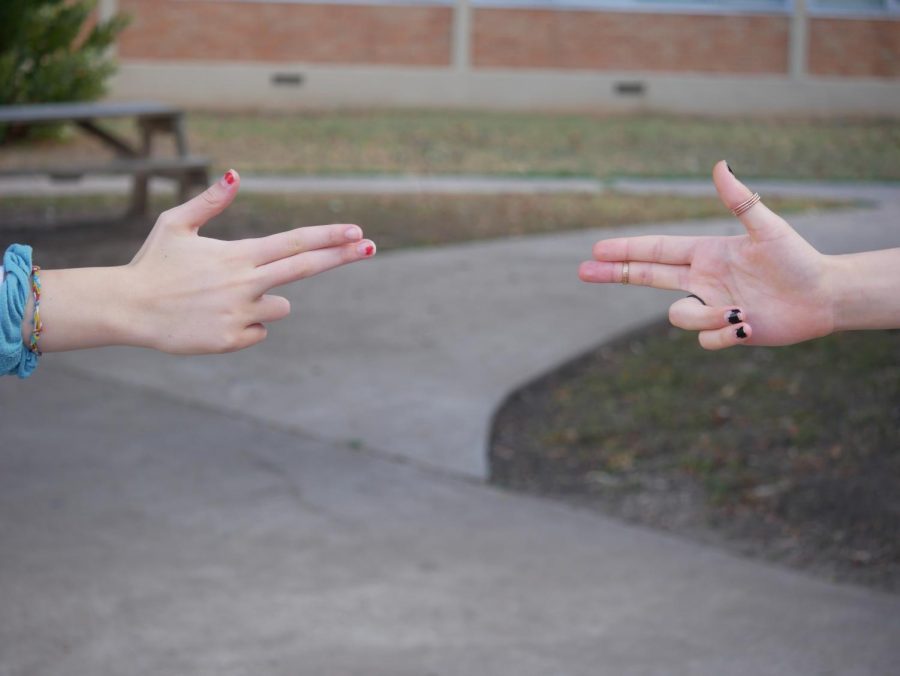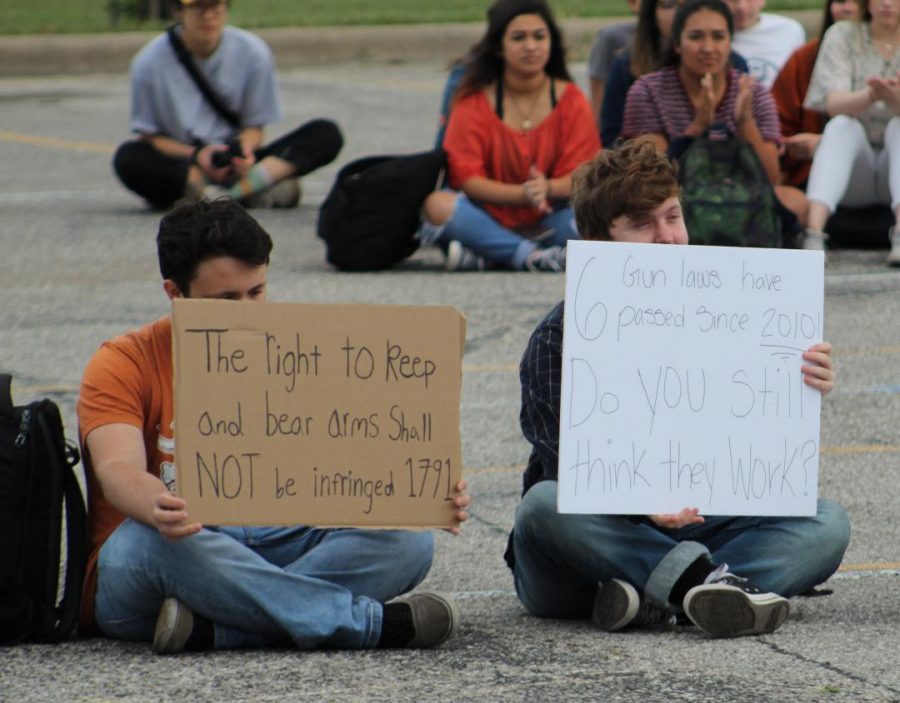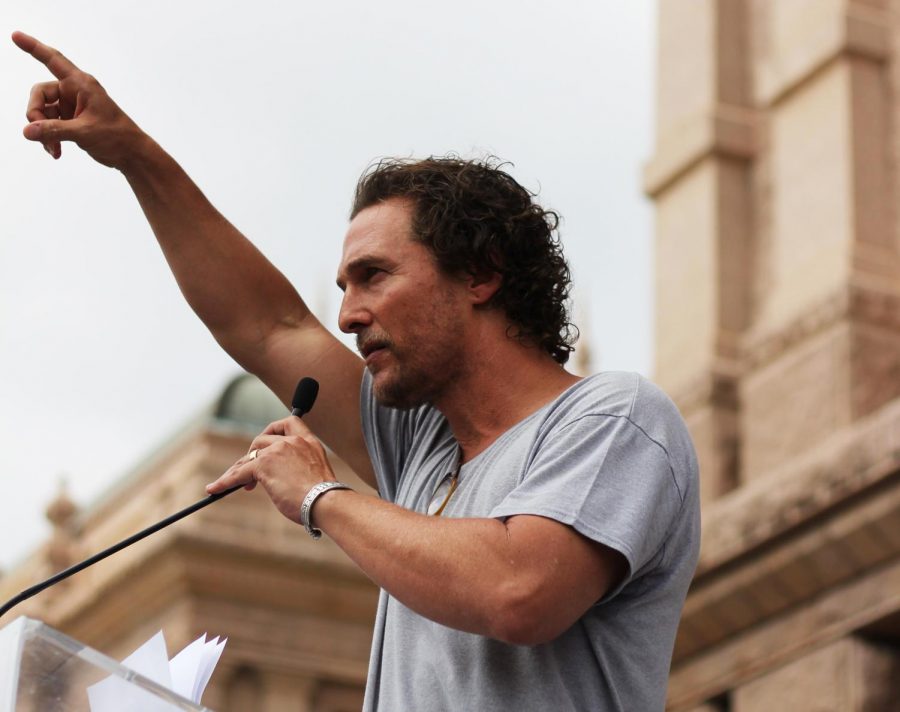The debate over gun control
We all know we have to get to a better place when it comes to gun violence in the United States. The question is: How do we get there?
October 22, 2019
Defending the rights of gun owners at the McCallum walkout in support of stronger gun control legislation on April 20, 2018, three McCallum seniors (two of them pictured here) sit silently counter-protesting at the rally in the parking lot. “I believe in the Second Amendment since it was instituted in the beginning of this country,” one of them said. “I obviously don’t believe in fully automatic weapons. They aren’t legal anyways. I’m pro-rifle, pro-gun and I’m pro Constitution.” One of the students asked to remain anonymous to protect future opportunities. Photo by Kien Johnson.
Banning guns is not the way to go
Recent shootings are a huge issue in American life. If we ignore that ever-present danger, we are only furthering it. It also must be acknowledged, however, that we attack the problem of gun control from its true source before we take away the constitutional rights of our people: the heart of the gun-violence crisis in our country isn’t with the guns themselves; it’s the lack of effective regulation of them and our societal failure to address the true cause–our institutions are failing to use the legislative weapons that they have available to protect people from being killed.
A lot of people fear guns because they fear how they can be used to inflict harm. The fault here is that while guns can inflict fear and death, they can also be a way for a defender to protect their family. Banning guns altogether isn’t fair, especially when neither view of them is complete because it is based on past experience and not fact. Taking away guns may create a sense of peace and security for some people–but there are people on the other side of the issue that believe less guns would mean less protection and the feeling of safety.
Arguments for banning guns revolve around the idea that banning guns will significantly reduce the amount of gun deaths. This is true. However, the amount of deaths in general should not change; the problem with killing is the purpose to kill. God forbid another person feels the need to do a shooting, but the fact is that if there is a will to harm other people for any reason, then people will harm them. Even if guns were fully illegal, the will is still there and damage will still be done with other weapons of mass destruction, unless the person gets some kind of help that addresses the root of the problem. The rash of mass shootings in the United States is a perfect example of how mental health impacts physical health. This proposes a possible solution: more access to mental health resources to decrease the obscene amount of shootings that America has; aka accessing the root of the problem.
Shootings aren’t a gun problem; they’re a people-wanting-to-use-guns problem. And as cliche as it sounds, it’s true and banning guns is only a topical solution to a deeper problem. People who feel the need to shoot people often do it either because grew up in a culture where it was normal and almost necessary to kill in order to survive, they are mentally ill, they are in some kind of crime of passion situation or they feel like a person or group of people needs to be exterminated for whatever reason. All of these situations have nothing to do with guns, that is just the usual weapon of choice. Banning the guns themselves can’t solve this issue.
I will admit that though I thoroughly believe that smaller guns should be allowed, there are some exceptions. Some guns are clearly meant for killing and those should be very heavy regulated; only being used for military purposes. Assault rifles are purposefully made for mass destruction and these kinds of rifles don’t help anyone that isn’t committing a crime. This also gives us a good compromise; banning guns that are frequently used in shootings, but letting people still keep the guns that they feel keep them safe.
So what do we do? We advocate for changed gun laws. First we require tight gun regulations for all kinds of guns. The process should be similar to getting a driver’s license; it should be difficult, with training with a licensed professional and gun law and practice courses necessary for obtaining a license, but not impossible. Second, we make mental health counseling available and affordable for anyone who needs it because mental health bills are less expensive than hospital ones. Working together trying to find a solution that will work for both viewpoints is the only way that we are going to see progress and change.
Actor and activist Matthew McConaughey was among the speakers at the #MarchForOurLives in downtown Austin on March 24, 2018, which attracted more than 10,000 to the Capitol today. “This is an American issue,” McConaughey said of gun control. “It’s a Texan issue. It’s a legal and law-abiding gun owner issue. It’s a mother issue. It’s a father issue. And, quite literally, this is our children’s issue.” McConaughey also said that consensus leading to action should be above politics. “My hope here is that we can find a common ground on what I see as a very much a common-sense issue. This is an issue anchored in purpose for all of us. It’s not anchored in politics.” Photo by Madison Olsen.
Banning guns is not a panacea
As a high school student in the United States, I know it’s out of the question to strip citizens of their Second Amendment right to own firearms. Prying military style assault rifles from the cold and clammy claws of the far right crypt that is President Donald Trump’s administration has become a lost cause. Focusing energy on excuses as to why gun violence is so prevalent today– violent video games, the lack of mental health support, as well as trauma or domestic violence in one’s background. Shootings and gun violence are so prevalent today because guns are still sold.
The argument that shootings are not an issue of guns, but one regarding people is faulted in itself. According to Merium-Webster, the definition of a shooting is “the action or practice of shooting with a gun”. Yes, that’s right, a gun. I agree that the access to mental health education and facilities is all too sparse in these trying times. However, guns are the real problem here. When talking about gun violence, we must consider the entire realm: mass shootings, homicides, and accidental deaths.
Starting with mass shootings, they are not just a problem of people wanting to harm people but a problem of access to weapons of mass destruction. According to the 2015 Mass Shooting Tracker, there is roughly one shooting for every day of the year in the United States, putting us at 355 mass shootings in 336 days. With guns circulating communities and getting into the wrong hands, people are dying in the masses.
Moving onto homicides, the statement that guns don’t kill people but people kill people is partly true, except for the fact that its people killing people with guns. As told by the Human Development Index, the United States holds the record for homicides by firearm: roughly 29.7 deaths per 1 million people, more than 3 times its runner up, Switzerland. For some, guns symbolize safety and protection. However, with more guns lead to more death. In a 2013 study from both the CDC and Injury Prevention, the correlation between the amount of deaths in an area and the ownership of guns is positive; a 1% increase of gun ownership comes a 1% increase in homicides by gun.
Gun violence is not only referring to the over 2,000 shootings that have happened in this country since Sandy Hook (Gun Violence Archive), but also to the increased number of suicides that come with an increased supply of guns. The name of the game here is “more guns, more death,” and suicide is no exception. Guns make suicide easier and quicker. According to the Journal of Epidemiology and Community Health, 96.5% of fatal suicide attempts wielded firearms, while only 7.6% used poison, and 5.1% cutting. Victims of suicidal tendencies and thoughts should have the chance to get help and have their voice heard, not be silenced by the simple trigger of a handgun.
Accidents happen, especially with guns. In an experiment conducted by the Emory University School of Medicine, they found that one third of boys between the ages 8-12 pulled the trigger upon finding a gun in their household. Critics would argue that it is unfair to ban everyday guns such as hunting rifles or handguns, but accidents are far too common and far too fatal. I would argue that at the very least, heavy restrictions be put on such guns in order to restrain the incidents from happening.
We can’t all be perfect. Mental health affects people in different ways and everyone has a different background, some filled with violence and some filled with trauma. Access to therapy, medications, or institutions is not going to solve the problem of outright violence in this country, and banning guns is only the first step of many. Deaths due to guns are not caused by violent video games and problems can’t always be solved by a good guy with a gun. Continuing to allow guns to circulate through our towns and in and out of our homes is reckless, leaving us to wait like sitting ducks until the next act of violence is to occur.


